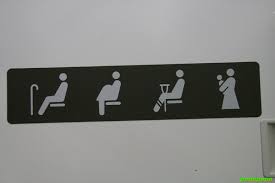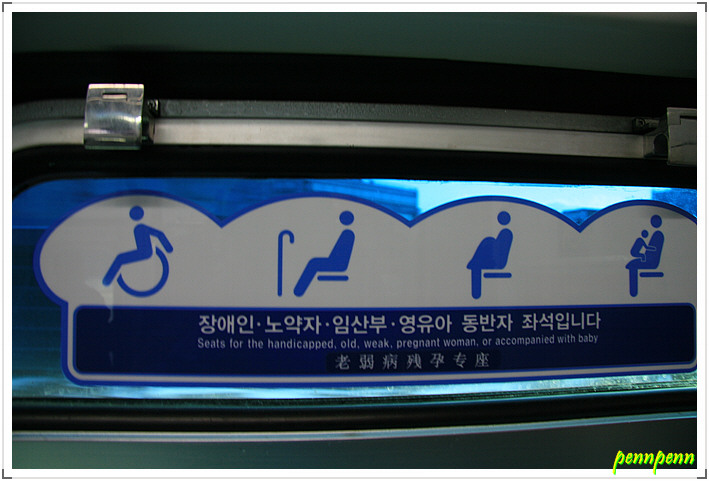Pre-natal wifi
« previous post | next post »
From Gordon Old:
The Japanese and the Chinese are simple and straightforward:
yūsen seki 優先席 ("priority seat")
yōuxiān zuòwèi 优先坐位 ("priority seat")
The Korean is a bit more complicated.
노약자석(老弱者席 RR no-yak-ja-seok; MR no-yak-cha-sŏk )
("seats for those who are elderly and weak")
Some colleagues would prefer this wording:
노약자좌석 RR no-yak-ja-jwa-seok; MR no-yak-cha-chwa-sŏk
Cf.
자석 RR ja-seok; MR cha-sŏk ("magnet")
좌석 RR jwa-seok; MR chwa-sŏk ("seat")
A Korean colleague writes:
The first two syllable are correct: 노약 = 老弱 but the third one is not. It should be "좌석" = 坐席 and not "자석." All I can imagine is that, because "자석" (ja-seok) and "좌석" (jwa-seok) sound similar, the person who wrote this misspelled it. Ah… I hope this is not an example from Korea. Shame, shame, shame.
One informant says that 노약자석 (as on the sign) is a commonly used term but is not sure about 노약자좌석.
"Priority seating" may be translated directly and literally as 우선석 (優先席 RR u-seon-seok; MR u-sŏn-sŏk), but it would seem that this term is not currently used on public signs.
See below for a couple of Korean signs in current use:
장애인 노약자 임산부 영유아 동반자 좌석입니다
RR jang-ae-in no-yak-ja im-san-bu yeong-yu-a dong-ban-ja jwa-seo-gim-ni-da.
MR chang-ae-in no-yak-cha im-san-bu yŏng-yu-a dong-ban-ja jwa-sŏ-gim-ni-da.
the handicapped, old, pregnant, accompanied with baby seats are
"Seats for the handicapped, old, weak, pregnant, or accompanied with baby".
Chinese:
lǎo ruò bìng cán yùn zhuān zuò
老弱病残孕专座
"seats reserved for the elderly, weak, ill, and disabled"
Without writing:

[Thanks to Haewon Cho, Bob Ramsey, and Daniel Sou]


Rubrick said,
April 11, 2015 @ 1:30 am
Do all pregnant women get priority seating, or only those whose unborn chldren are Wi-Fi enabled?
DaG said,
April 11, 2015 @ 2:30 am
In an Italian local newspaper I read once a complain by a reader who considered herself insulted by the fact that on buses there were seats reserved, among others, to overweight women. Might this kind of misunderstanding be the reason for the “wifi” thing?
Rubrick said,
April 11, 2015 @ 2:31 am
And now I go back and read the title. I read the whole text in vain looking for some mention of the really odd "pregnant" symbology.
GH said,
April 11, 2015 @ 2:41 am
Perhaps interesting that in the last sign, the "person with baby" is portrayed as female, while in the other two it's a "generic person" tending more towards the male.
And without the context and explanation, I would not have recognized the non-wifi pictogram of the pregnant woman. That's a scary baby bump! Looks more like someone sitting with crossed legs.
maidhc said,
April 11, 2015 @ 4:50 am
One of those looks like "person travelling with small primate". Is that allowed?
Might as well go ahead and allow parrots while you're at it.
Adrian said,
April 11, 2015 @ 12:41 pm
Maidhc, my nephew is a small primate. Technically. (Actually, he is a medium-sized primate now, and prefers to sit by himself. But he has always been allowed on transit.) The picture seems at least as realistic as the one with the freestanding cane that would be more than arms-length away from the seated person, if the person had arms.
Jongseong Park said,
April 11, 2015 @ 2:49 pm
What? There's nothing wrong with 노약자석 老弱者席 noyakjaseok unless you object to the word choice of "seating for the old and weak". This is a very widespread term in Korea and I've never heard anyone question it.
석 席 seok "seat" is a very productive hanja element that produces numerous compounds such as:
경로석 敬老席 gyeongnoseok "respect-the-elders seating (seat for the elderly)"
금연석 禁煙席 geumyeonseok "no-smoking seating"
보호석 保護席 bohoseok "protected seating"
You rarely see the free-standing form 좌석 座席 jwaseok in such compounds—it's virtually always just 석 席 seok. 노약자^좌석 老弱者座席 noyakja jwaseok would be two words (and strictly speaking, in South Korean orthography, we should put the space between them) and would be rather unnecessarily cumbersome when you already have the familiar 노약자석 noyakjaseok.
A Korean wiki article on 노약자석 noyakjaseok has the following warning:
의외로 노약좌석으로 알고 있는 사람들이 꽤 있다. 헷갈리지 않게 주의하자.
Unexpectedly, a number of people know this [incorrectly] as 노약좌석 noyakjwaseok. Be careful not to confuse this.
So 노약좌석 noyakjwaseok as an eggcorn for 노약자석 noyakjaseok is not unknown. But it's considered wrong.
KWillets said,
April 11, 2015 @ 3:59 pm
노약자석 seems to be the preferred spelling everywhere; even searches on 노약좌석 bring it up. It seems to be case of homonym confusion between 노약자 (老弱者 — old and infirm) and 좌석 (座席 — seat), relating to the -석 suffix.
It seems that (noun)-석 means "seat for (noun)", but appending it here produces two syllables that look like 좌석 which is the standalone (sitalone?) noun for "seat".
richardelguru said,
April 13, 2015 @ 6:57 am
@maidhc
One of those looks like "person travelling with small primate"
And of course it is! Unless your thinking is turning to the Archbishop of Canterbury, or some such, we Homo sapiens sapiens* are all mammals of the order Primates.
___________
* I've often thought that ole Linnæus was being a most unwise man when he named out species, and the more modern habit of differentiating us form H sapiens neanderthalensis gets well into 'the lady protests too much, methinks" territory!
richardelguru said,
April 13, 2015 @ 7:04 am
That was weird: page took forever to refresh and then didn't show my comment so I made a correction ("Out, out damned 'out'") and ended up with two of the buggers!
Sorry
[VHM: No problem. These things happen from time to time. I removed one of them.]
Jon Weinberg said,
April 15, 2015 @ 8:47 am
In Japan, I was often struck by a similar phrasing there, as in the fourth image reproduced at http://blogs.yahoo.co.jp/rtrainjp/29773560.html , referring to seats for お年寄りやからだの不自由な方 (the elderly and disabled)
E-Ping Rau said,
April 19, 2015 @ 8:51 pm
It may be interesting to point out that in Taiwan at least, the word 博愛座 (bó ài zuò) is used; 座 corresponds to 좌 in Korean, while 博愛 is word for "fraternity/agape" (literally wide/vast/various love), as in the following picture: http://ext.pimg.tw/hgc0818/4a0c0baeb0658.jpg
You also see the phrase 老人、孕婦、行動不便及抱小孩的乘客
lǎo rén, yùn fù, xíng dòng bú biàn jí bào xiǎo hái de chéng kè
("old people, pregnant women, and passengers who are mobility-challenged or holding a baby")
行動不便 ("mobility-challenged" is the best translation I can come up with at the moment) is apparently a euphemism for "handicapped".
People who are given priorities are also called collectively 老弱婦孺 lǎo ruò fù rú ("the elderly, the disabled, pregnant women and passangers with children"), as in this picture: http://farm9.static.flickr.com/8286/7722335740_46ddaae19b.jpg
Compared to the Chinese (?) version 老弱病残孕, the three characters denoting disability/illness 弱病残 is merged into one 弱, 孕 is substituted by 婦 (nevertheless it's still only pregnant women who are really included), and 孺 is added.